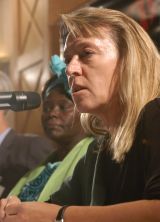UN should act or be silent on Darfur atrocities – Nobel laureate
March 12, 2007 (GENEVA) — Nobel peace laureate Jody Williams says it is time for the United Nations to act on its oft-repeated pledges to protect civilians in Darfur.

Reached by telephone at her Virginia home on Monday, Williams told The Associated Press that protecting civilians had to be the first step to solving the conflict.
“The refugees we spoke to were adamant that without protection and security they wouldn’t go back to their homes, ever,” she said.
Williams, who won the peace prize for spearheading the campaign that led to the treaty to ban land mines, was speaking on the day her team’s report was given to the U.N. Human Rights Council in Geneva.
The U.N. Security Council has repeatedly voted to take “all means necessary” to protect civilians from violence, but the global body has been frustrated by Khartoum’s refusal to allow a significant military contingent to join the existing African Union mission in Darfur.
Williams, whose human rights work has taken her to Geneva, Ethiopia, Chad as well as to a conference in Norway on banning cluster bombs in a matter of weeks, said the credibility of the United Nations was at stake if it did not act.
She said enforcing the resolutions did not mean military action against the government in Khartoum, “but it does mean protecting the people you said you’d protect.”
“If you’re not prepared to act on what you say, don’t say it.”
Under a three-stage plan, the U.N. is to send military, police and civilian personnel along with aircraft and other equipment and supplies to Darfur.
But resistance by Sudan’s President Omar al-Bashir have held up the deployment for two months, during which atrocities in Darfur continued.
The Sudanese government refused to allow Williams’ team to enter Sudan, so much of their research was done among Darfuri refugees in neighboring countries.
“At first there was an effort to delay entry to the end of the February, which would have made it impossible to present a report for this session,” Williams said Monday. “That was one consideration. They had problems with different members of the mission at different points in time.”
Her team’s report has already met with harsh objections behind the scenes from Sudan’s allies in the rights council, chiefly members of the Organization of Islamic Conference, and could still be dismissed.
“If it’s blocked, which some are wondering might happen, then I think one should really consider the future and meaning of the council.”
In scathing remarks about the achievements of the council since it replaced the discredited U.N. Human Rights Commission last year, Williams said the world did not need “more political games in Geneva.”
She also said there had been undue pressure on her team by some states in the council to balance criticism of Khartoum with similar criticism of the rebel groups.
“To recognize that the rebels have violated human rights is perfectly fine. But to say that they are on the scale of Khartoum and janjaweed militia is absurd,” Williams said.
(AP)
